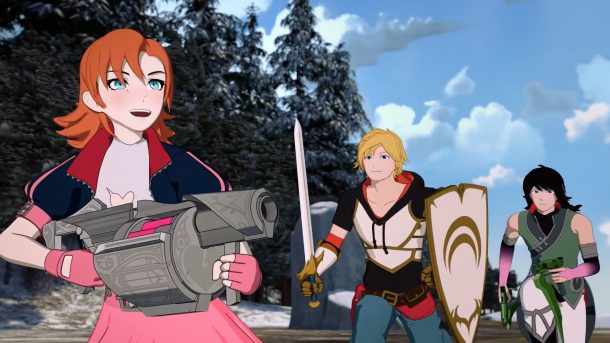How do you even start to talk about RWBY? There’s so much to unpack here. It’s not for no reason that the online discourse on this show is both so extensive and so heated. I’m not going to delve deep into every little issue, but just reflect in broad terms on what RWBY did right, what it did wrong, why I think it ended up the way it did, and why you might love it anyway. I’m not going to mince words too much but I think this is going to be a constructive and positive post in the end.
The Good With The Bad
Most pieces on RWBY either tend to heap praise or lay on criticism, and I’ll get into why I think it tends to be so polarizing in part three. At the risk of sounding wishy-washy, I found it to be a mixed bag with good parts and bad parts. It’s nowhere near as bad as some critics imply, but it’s also far from the perfect show its most ardent defenders insist it is.
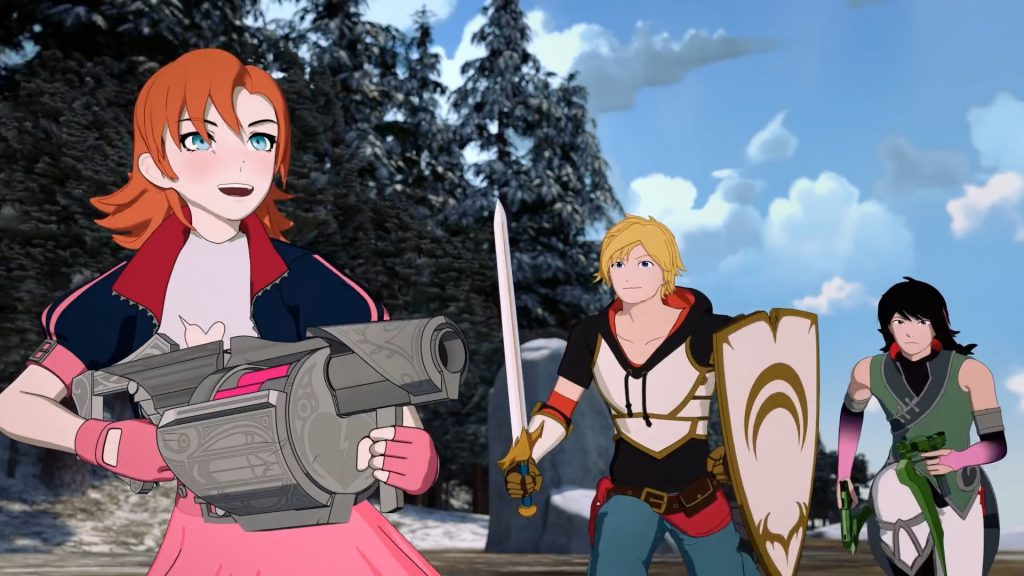
First and foremost, RWBY is a visually stunning show. It has a distinctive visual style with bright colours and bold designs. Yes, it occasionally stumbles in the details, and for some reason they’ve never been able to quite nail the walking animations, but for the most part it’s a visual treat. As time goes on and budgets go up, the visuals keep getting more and more impressive, going from “amazing for what they had to work with” to “fantastic, period”. The divisive 3D style is used to its full potential, pulling off cinematography that would be difficult or impossible in traditional animation.
The fight scenes are RWBY’s unique selling point, for better or for worse what the show was built around. There are occasional misses, but the fights are overwhelmingly intense, stylish, and thoroughly enjoyable. The animation is fluid and the effects are flashy. The fight scenes are great from the very beginning, but get bolder and more visually interesting as the animators gain experience and the budget goes up.
The characters are the other big draw of the show. While they might be underutilized- and we’ll get into that- they’re fun, have great chemistry with each other, and feature the same bright, bold, distinctive kind of designs as the rest of the world. The voice actors- most of whom started off with no voice acting experience- put in strong performances that got better and better as the series went on.
The music from Jeff Williams and Casey Lee Williams is phenomenal. The tracks fit perfectly, jump from genre to genre with ease, and are almost all absolute bangers. Almost every character has a leitmotif and they’re used effectively. It’s always been a standout strength of the series.
It might not have been done deliberately, but RWBY subverts a few trends in a way that I really appreciate. While characters do have conflicts, characters that are friends and comrades are believably friends and comrades rather than constantly yelling at each other for no good reason. It presents a world where action girls are no big deal and misogyny just kind of isn’t a thing, which is refreshing, and manages to avoid creepy oversexualized fanservice.
While the characters are fun and their chemistry is great, the character arcs are a mixed bag. The plotlines, too, never really rise above the level of passable. There are a few attempts to tackle serious issues like racism, trauma, and fascism, but they’re incredibly ham-fisted and often have frankly awful takes even for the time. Though comedy is a strength of the showrunners, later volumes tend to awkwardly shoehorn it in, which leads to wild shifts in tone.
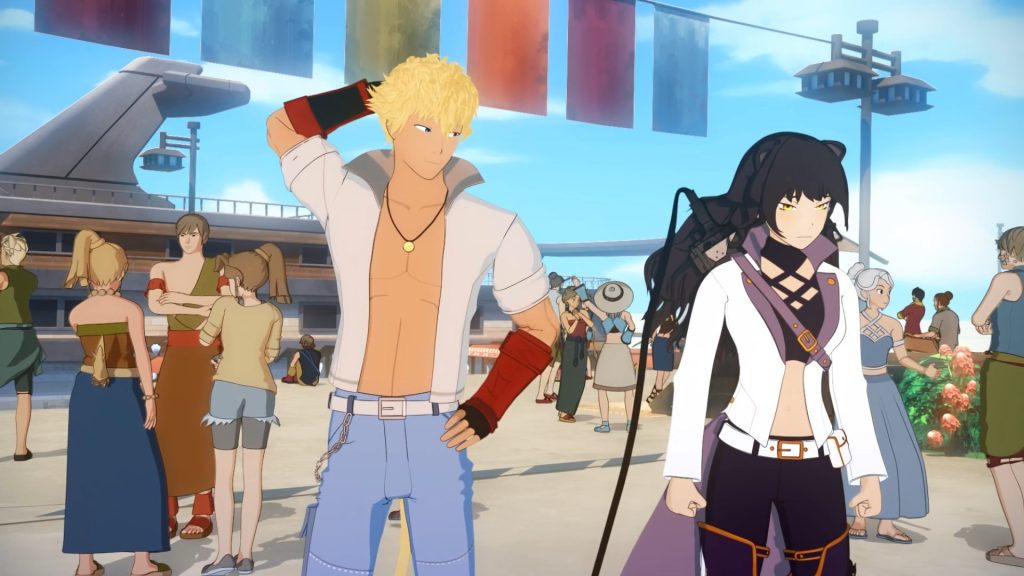
The worldbuilding, frankly, is atrocious. The setting could be incredibly interesting in theory, but the world as presented is implausible, inconsistent, and poorly explored, and the mythology or “deep lore” is a confusing mess. It feels like it was thrown together as they went, but even things that probably were properly established behind the scenes were poorly explained to the audience. Things do get somewhat better in later seasons, but they still struggle with a sense of scale, and though the new mythology is better thought out, it’s heaped on top of the old mess.
Something that really bothered me once I noticed it is how characters seem to just disappear from existence once the plotlines they’re involved in are done. We don’t see even a glimpse of them, and they’re rarely even mentioned. I do think a lot of it has to do with the limited runtime and overall pacing, but I’ll get into that specifically in another section. We did get thrown a bone here in Volume 8, so this is something that might get better if the series continues.
RWBY has caught both praise and criticism for its production values, depending on who you’re asking and what era you’re looking at. I think in general it punched above its weight class, but there’s no question that the early volumes are incredibly janky compared to the later ones, to the point where they feel almost like fan versions or demo reels by comparison.
Over its decade long run, RWBY evolved a lot, addressing some of the problems, adding some new ones, and continuing to struggle with others throughout.
Let The Chips Fall
A concept that comes up a lot in RWBY discourse is the distinction between Early RWBY- Volumes 1, 2, and usually at least most of 3- and the Later RWBY that came after. Usually this is by its detractors: early RWBY good, everything after bad.
Personally, I think that this is both overly reductive and requires viewing the early volumes through rose coloured glasses, but I also think that something was lost at the end of Volume 3. Beacon Academy could be viewed as the anchor which the series revolved around, and when it fell, it wasn’t just the characters that never found their footing again, but the show itself.
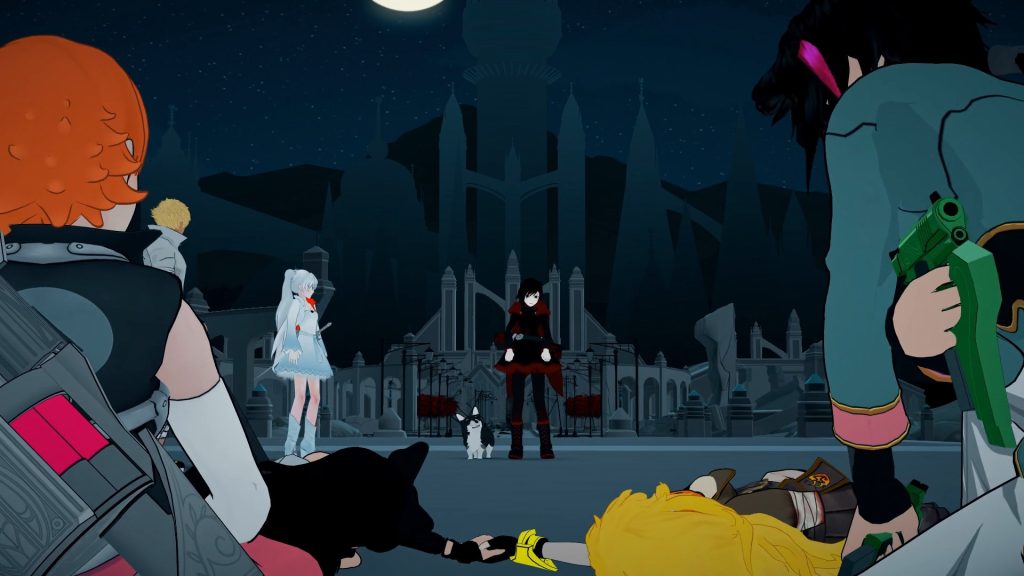
As crazy as it sounds, I do agree that early RWBY was better for what it was. Key words being for what it was. I don’t agree that early RWBY was objectively better, just that it was playing in a space where it didn’t have to be. It was a super indie passion project of silly hijinks, petty drama and wacky adventures, driven by Rule of Cool and Throw It In.
Were there already critics picking it apart? Of course. In some ways, I was one of them. But a big chunk of the audience was cool with RWBY as it was, and was just happy it was there.
Until, at the end of Volume 3, RWBY took a turn for the dramatic, and all but declared that it was done being that quirky little thing and it was going to be a serious show now. It had taken a swan dive off a high board.
It did not stick the landing.
Volumes 4 and 5 are commonly held to be the worst of the entire series. I thought Volume 4 was an awkward mishmash of generic fantasy tropes and incredibly boring overall. Volume 5 was better, in my opinion, but still didn’t live up to what the end of Volume 3 had set up.
The ending of Volume 3 fundamentally changed how RWBY would be perceived, but it feels like the showrunners continued business as usual without really internalizing that. The lore and worldbuilding needed to be a lot tighter because it was going to be seriously analyzed, but it kept going on regurgitated tropes and visual appeal over consistency. The tone and pacing continued to jump around and the writing still felt amateurish, unable to grapple with serious plotlines and darker themes. Things did slowly improve, but not until years later, well after the point where it needed to step up.
I think there’s another, slightly different way of viewing it. The first two volumes knew what they were trying to be, even if that wasn’t very ambitious. Volume 3 was a kind of transition, and after that it never really figured out what it was going for again. Volumes 4 and 5 were generic fantasy, Volume 6 was an anything-goes mishmash, Volumes 7 and 8 tried to be a techno-thriller, and Volume 9 fairytale fantasy. It was a fun ride, more often than not, but it never stopped feeling lost.
Were Mistakes Made?
At some point, you have to ask the question: Should RWBY have stayed a fun, low-stakes show, and never tried to up the ante?
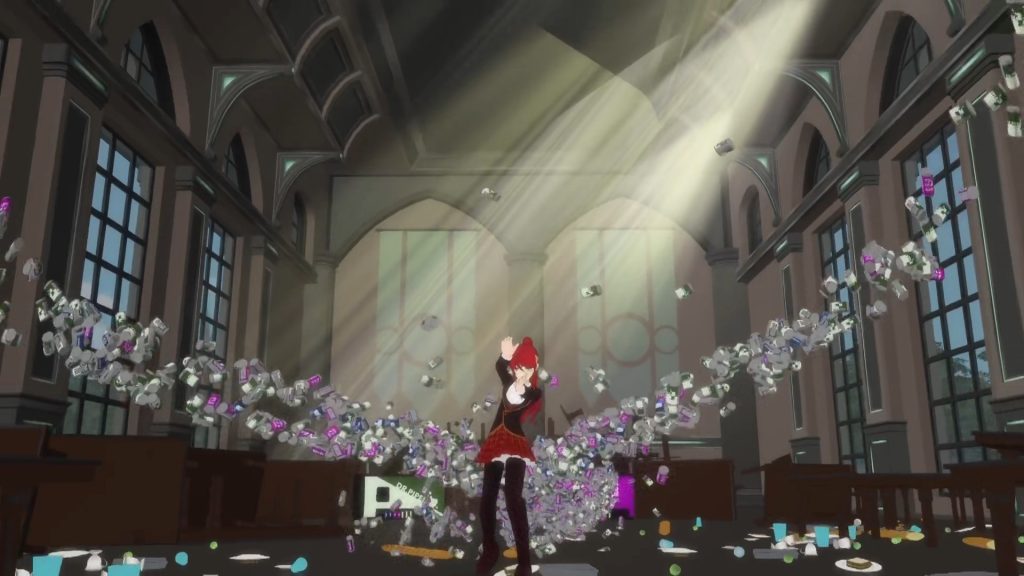
I’m a bit torn on that, personally. I definitely would have enjoyed it as a fun comfort show, but I was already getting annoyed with all the deeper lore and darker storylines it was hinting at but not yet exploring, and that would have eventually been a problem.
Which leads to another question: Was RWBY set up to fail? Or, a milder formulation of essentially the same question: Did they write themselves into a corner?
I think, from the very beginning, there was some expectation that the shoe was going to drop eventually and that RWBY was going to move in a darker, more serious direction. The trailers, especially the very first Red trailer, implied a very different show than the one we got. I thought it was going to be a fairytale-inspired dark urban fantasy, not an action comedy with an academy setting. I remember at the time a lot of people were disappointed when the first episode dropped.
The show, too, hinted at a darker turn. While the main plots remained relatively lighthearted, there were plenty of hints in the dialogue that things could go bad at any moment. On top of that, the lyrics of the music often implied traumatic depths to the characters and seemed to foreshadow dark machinations in the background.
I think while the showrunners had planned the turn from the beginning, though, they weren’t really prepared for how big of a shift it was.
What Happened Here?
Now we get into the juicy bit: why? Why was RWBY made the way it did, why was the ball fumbled on so many important aspects? One disclaimer up front: I’m not privy to anything that happened behind closed doors, nor am I even particularly well-read on what didn’t. This is mostly going to be opinion and unfounded speculation.
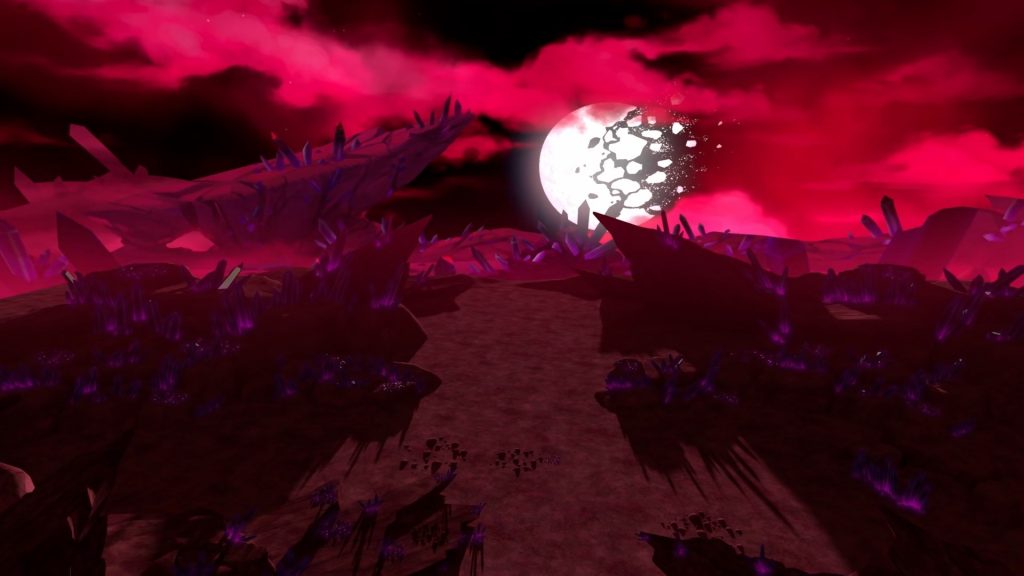
I think, at the heart of it, RWBY’s ambition simply outstripped the ability of its creators.
I’ve talked a lot about the narrative shift related issues, but I think this it’s actually the length and pacing issues where this shows through the most. Even putting aside the hilariously short first volume, RWBY often feels like a 40-minute show crammed into less than 20 minutes, or one with 20-episode seasons cut down to 10. While there are slow episodes and even slow volumes, the pacing is usually breakneck, and there’s so much that feels like it’s being skipped or glossed over.
From the beginning, I’ve always been struck by how uneconomical, for lack of a better term, RWBY was. For one, it doesn’t make efficient use of its time. There are way too many characters, too many sideplots, too many extraneous perspectives. It’s also just plain expensive, leaning heavily on animation-heavy fight scenes and elaborate set pieces over visual shortcuts and simple scenes. In a little of column A and column B, cool ideas are thrown in with little thought of their cost or consequences, sucking up budget and screen time and causing more problems down the line.
This might be more contentious, but I think they eventually did catch up to their ambition. While the last few volumes still don’t feel like they’ve quite landed, they’re a lot more coherent, not to mention the vastly improved production values. The handling of things like lore and character development got a lot better, too. Not perfect, but better.
The problem is, by that point it was too little, too late. There was so much baggage, from loose end plotlines to questionable character development to messy lore weighing the show down. On top of that, it’s just plain tough to win back the crowd. A lot of people- myself included- had already moved on.
With all that being said, RWBY would have been a very different show had its creators treaded more carefully, and that’s something I’ll come back to at the end.
The Monty Factor
You can’t talk about RWBY without talking about Monty Oum. That’s the rule, and I don’t make the rules!

I never knew Monty, and only knew about his work in passing when I discovered RWBY. If you grew up on the internet at a certain time, though, he was very present as one of those vaguely familiar names that would pop up attached to some random cool thing every so often, in a very “wait wasn’t that the guy that made…” kind of way.
Monty was an incredibly inspirational figure. He was incredibly talented and dedicated, and his creations remain internet classics. This is not heaping praise on someone because they are no longer with us- even at the time, Haloid and Dead Fantasy were considered iconic. He was one guy who made these amazing things in his basement, and that was something us budding internet creators looked up to. RWBY was his magnum opus, there was nothing like it at the time and it could not have happened without him.
Now, for the controversial part.
Not only do I disagree that RWBY died with Monty, I don’t think it would have had much bearing on the show’s biggest issues. Monty was an incredible animator with a keen sense of visual design, but those were never what RWBY struggled with. It was the writing that was the problem, which was never his strength and was something he’d largely delegated to Miles and Kerry from the very beginning. I think if Monty had lived, RWBY might have been a bit nicer visually, and it might have bought a volume or two of goodwill, but ultimately the writing issues would still have caught up with it.
It’s All Relative
RWBY is an easy show to criticize. It has a lot of issues that were never really solved, and frustratingly hinted at a lot of potential it never fully lived up to. There are tons of pieces out there that tear the show apart, and most of them have a point. Even this post could be taken as one, but that’s not really what I’m going for. In a roundabout way, I’m actually trying to come to its defence.
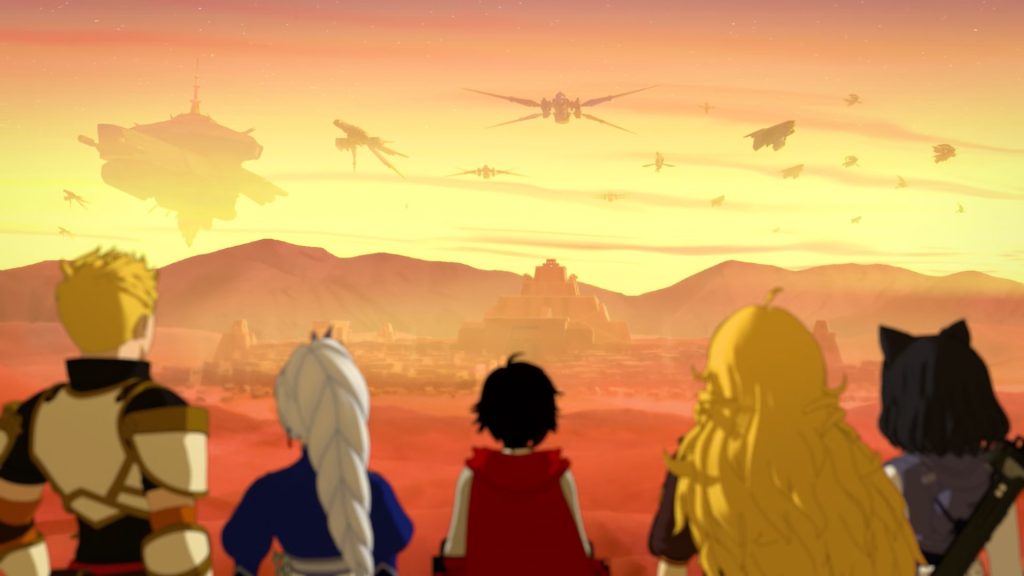
Here’s the kicker: how much the problems of the show affect your enjoyment of it is going to be highly variable and subjective. There are issues with the show that really bothered me, but not until I actually sat down after a watch session and pondered it for a while. By the same token, I saw problems others didn’t, and they saw ones that passed over my head. Watching the whole series in the span of a few months is different than waiting for every episode, and that coloured my perception of it, too.
If there’s any real thesis to this overly long, rambling mess of a post, it’s that a show- or any piece of media, really- doesn’t need to be perfect for you to be a fan of it. And it doesn’t need to stand up to scrutinous critique to be enjoyable in the moment. It’s okay to like a thing and acknowledge that it’s flawed or even outright bad, yet for one reason or another you love it to bits anyway.
While some of the melodramatic plotlines in Volume 1 and Volume 2 received criticism for taking away from the main plot- and justifiably so- I think they did resonate with the tween-to-young-adult audience of the show. Certainly, they resonated with me at the time. And while it might have made a better show to focus on the main plot at the expense of sideplots and slice of life, I can’t help but feel it would be a lot less fun.
Similarly, those intense fight scenes and epic set pieces were expensive, but they were also a core part of the show’s appeal. Slowing things down and shifting the balance to cheaper limited-animation dialogue scenes would give the story room to breathe, but it also would have had a lot less energy and excitement.
I get why you might be disappointed by RWBY if it turned out to not really be what you were looking for- or what you thought it would be from the trailers. And I understand the frustration of seeing the wasted potential of what it could have been. At the same time, while RWBY could have been a better show, it would also have been a different show, and I don’t know if it would have been one I latched onto the way I did.
There are always tradeoffs to be made, and as they say, hindsight is 20/20.
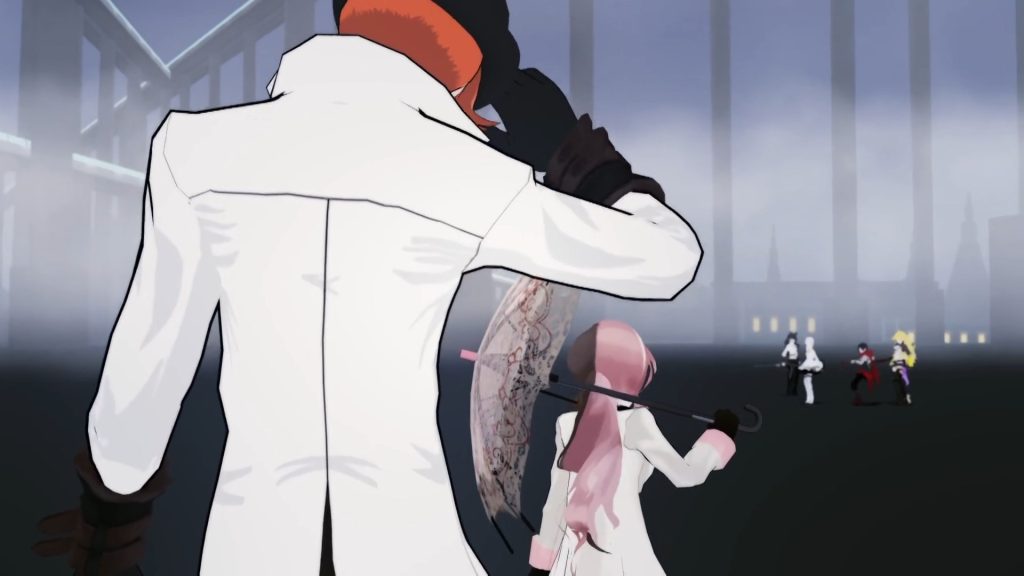
This is really a subjective and nebulous thing, but at its heart RWBY is a show that stays fun and retains a certain charm that kept me invested in it even as it stumbled moment to moment. It wasn’t enough to keep me watching last time, but I missed it in a way, and I did come back to it eventually. It’s hard to place where this is coming from- maybe the characters, maybe the idea of the world, maybe the visual style, maybe a combination of things- but I think if you’re drawn in by the first volume you’re probably going to feel the same way because that feel is established early on.
A footnote question I keep going back to is whether RWBY is a bad show in comparison. It’s flawed compared to some platonic ideal of a show, and it falls short when you cherry pick examples of excellent shows, but is that a fair comparison? Or should it be held up against the average? Or low-budget, indie web shows? If so, how does it look in that kind of context? Unfortunately, I’m the wrong person to answer this. I only watch a few shows a year, and most of them aren’t good points of reference. I will say that it’s a lot more fun than the Halo TV series, and it at least isn’t allergic to concluding its plotlines like Disenchantment.
I’ve touched on the fandom a bit, but in the next (and final) part I’m going to dive deeper into that quagmire, the good and the bad and a bit of speculation on why it ended up so deeply polarized. I’m also going to reflect on my own experiences in the fandom and how RWBY influenced me as a creator, which I think is what I originally promised with this whole series. Given that this piece took me almost a month longer than I thought it would, it could be a while before that one comes out, though.
